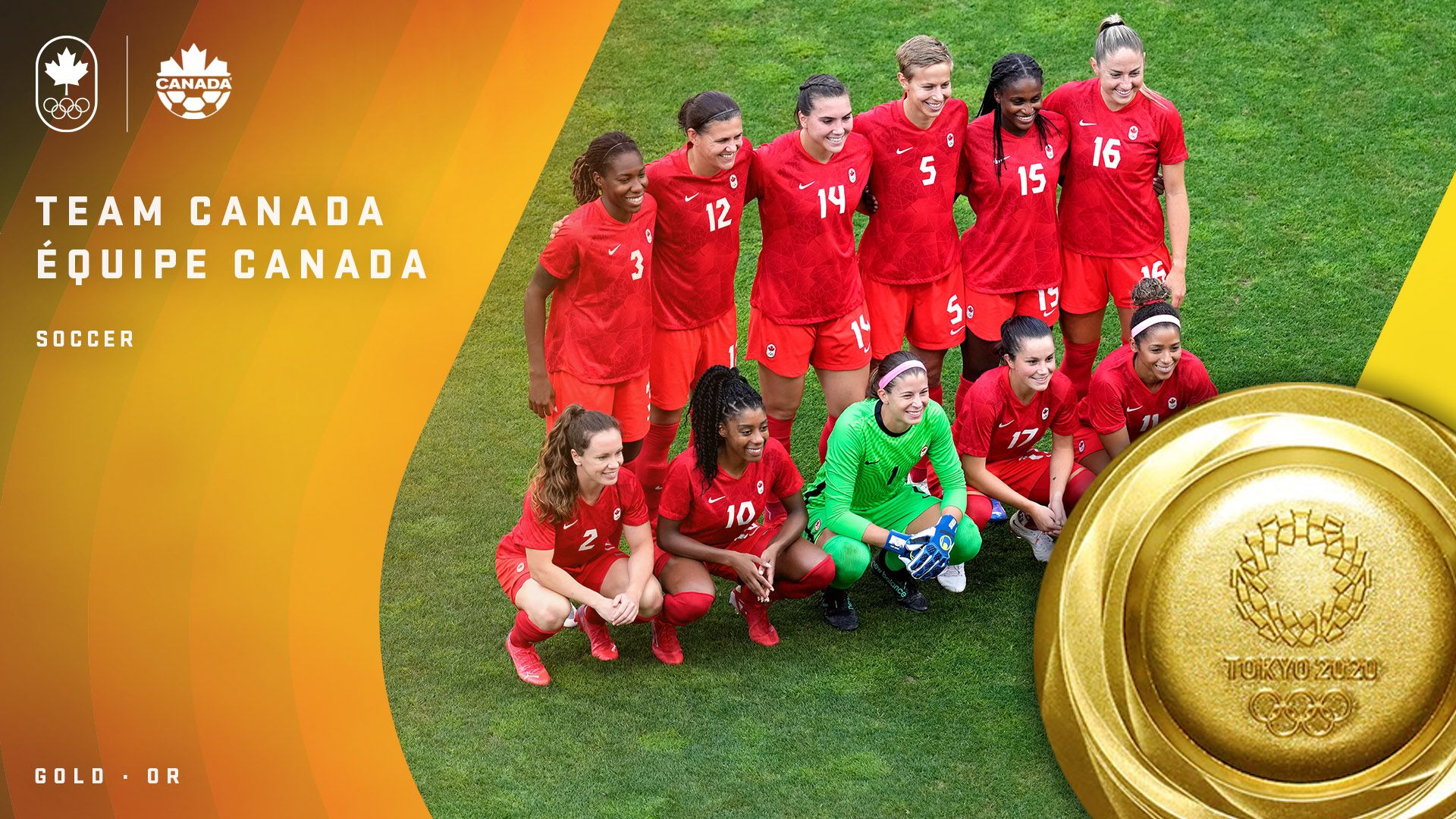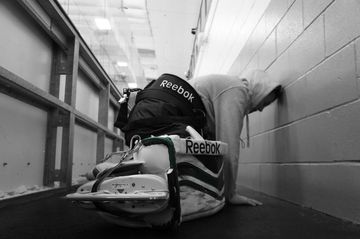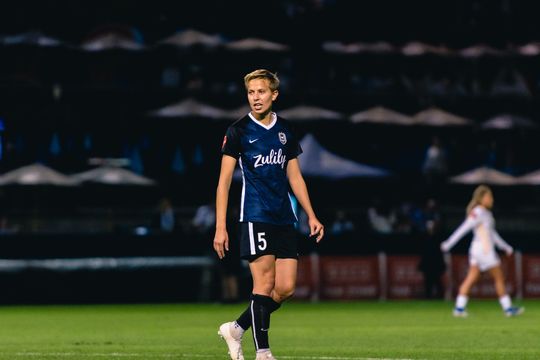A trans athlete is an Olympic champion.
Canada's thrilling victory over Sweden for soccer gold came down to penalties, with Canada's Julia Grosso making the winning kick.
With that kick, Quinn, the Canadian midfielder, became the first publicly out trans and nonbinary Olympic medalist. The first publicly out trans and nonbinary Olympic champion.
As a trans Canadian, one who grew up playing girls' sports like Quinn, it is hard to put into words the significance of this moment. It's hard to explain why it's so bittersweet. As a trans fan, it was really hard to watch the coverage of Quinn's achievement and the team's success, because even ostensibly supportive coverage served to erase and misgender Quinn.
Soccer has the expression "against the run of play", and Quinn's gold medal certainly qualifies. Cis people have made playing at an elite level virtually impossible for trans and nonbinary athletes. Quinn made it anyway.
Those who oppose trans and nonbinary inclusion in organized sports want a world free from trans and nonbinary people. They want to exterminate us. That is the goal. By restricting our participation, they eliminate us from public life. Transphobic people have columns in prominent papers, host popular talk shows, have leadership positions with international sporting organizations. Transphobia – not trans inclusion – is the dominant, prominent belief. We should evaluate Quinn's golden achievement against those orchestrated and prominent opinions wanting to eliminate people like us to truly understand the magnitude of that medal.
It was not an easy path to the gold medal on the pitch and Quinn faced additional barriers off. The vitriol that drives gender-exclusionary policies was also on display at these games. Trans and nonbinary athletes faced ridicule, attacks, and frequent misgendering. The same tired and bigoted discourse about "unnatural advantage" took place. Disgruntled and pathetic cis athletes continue to undermine the legitimate victories and achievements of Black women.
To take to the pitch in these conditions is truly remarkable. To be out as a trans person, period, comes with difficulties and barriers, but it has additional potential to be overwhelming when your life and profession are in the international spotlight.
Quinn's words on their deliberate choice to come out publicly resonated with me deeply: "I just wanted my identity to be respected every single day in the media when talking about my football." In another interview, Quinn added, "I wanted to make sure that my identity was represented in my workplace." I understand wanting to be respected for who you are in all aspects of your life, how hard it is to do your job when you are misgendered and disrespected every day. Quinn has talked about the support they were already receiving from the people in their life. Their coming out was about the public part of their job as a soccer player. They came out publicly to make change in that sphere. Were Quinn not a professional and international soccer player, their "coming out" story would be much different, and they draw attention to that for a reason.
When Quinn came out, their NWSL team and the league itself ignored it for days. NWSL commentators constantly misgendered them. Quinn still made it to the top.
On the way there, though, CBC's commentary team essentially ruined the broadcast and their presentation of the Canadian national team's remarkable run to Olympic gold. It is not surprising that Nigel Reed has not been held accountable for his transphobic behavior on the broadcast. He won't be. Cis people get endless chances and repeatedly choose transphobia and indifference. He even admitted it was wrong to misgender Quinn, but continued to do it for the rest of the tournament.
Reed and his commentating partner Dr. Clare Rustad tried to correct this behaviour in the final. Reed mentioned Quinn's historic achievement and even used the word "transgender." But when he used that word, it felt to me like being stabbed. The attempt at inclusion felt violent because of who it was coming from. Reed's use of the word at that moment, after his earlier insistence on misgendering Quinn, felt like a condescending joke. Dr. Rustad, who remained silent on Reed's earlier behaviour, also misgendered Quinn in the final, compounding the harm she had already caused by staying silent about Reed. It will be excused as ignorance or accident, but it was repeated time and again over two weeks. The only explanation is a deliberate disregard and malice towards Quinn and towards trans people.
Again, Quinn came out publicly to be a visible example of a trans and nonbinary athlete. Quinn's public coming out and continued participation in sport illustrates that both men's and women's sports are false categories; both already belong to and include trans, nonbinary, gender nonconforming, and intersex people. But even Quinn's supporters and supporters of the Canadian team often reinforce binary standards when discussing their support. Transphobia can be glaring, like the intentional misgendering that Reed did all tournament, but it can also be more subtle and indirect, like continuing to refer to the entire team as "women" when there is clearly at least one person there who is not.
It's a reminder that anything we accomplish can be used against us. We are erased from our achievements, our successes invisible, failures magnified. Seeing the CBC congratulate Quinn's historic achievement as a trans athlete while simultaneously running stories like "Canadian women win gold after roller-coaster penalty shootout" and continuing to put Reed on the broadcasts reinforced how performative that congratulations actually was. The inclusion is superficial; the hard structural change still needs to occur. The sporting world has yet to even begin the work of true trans and nonbinary inclusion in sport because they are unwilling to dismantle the binary framework that sport is built on.
Quinn has endured considerable bigotry to provide this example for you, knowing many trans and nonbinary athletes will never get the same opportunity. Public, prominent examples often must carefully monitor their behaviour in the face of extreme discrimination, knowing they represent countless people like themselves. That doesn't make the utter lack of respect shown to Quinn any easier to digest. If you cannot respect and celebrate trans, nonbinary, intersex, gender nonconforming people, you cannot call a game. If you cannot accept Quinn as a member of the Canadian Women's National Soccer Team while acknowledging their gender, then you have no business celebrating.
At the height of Quinn's achievement, it was clear to me that they could only be on that podium because of all their teammates standing with them. If Quinn's achievement inspires trans folks who watched or provides someone who really needs to see themselves in the media they consume with an example of a nonbinary trans person doing their thing, that is a much greater outcome than any Canadian sporting achievement. I wish there had been such a prominent example when I was a kid – that I'd grown up watching someone like Quinn. Maybe there would have been less pain and less years of my life wasted. Maybe it would have been a little less lonely.
But the inspiration shouldn't just be for trans and nonbinary folks alone. Team Canada issued a challenge to every cis person watching. When we talk about the leadership of Sinclair, Scott, Labbé, Lawrence, Buchanan and the rest, when we discuss the love each player has for their fellow teammates, do not ignore the fact that the team made their dressing room a place where Quinn could be themselves. They showed Quinn the same love and respect when they were out just to the people in their life as they did when they came out publicly. Let that action, that creation of conditions for a trans and nonbinary person to flourish, be a call to action to every cis person. Trans people can only survive, can only blossom, can only truly live, if cis people finally start doing something. We can only truly win if everybody starts pulling their weight.





